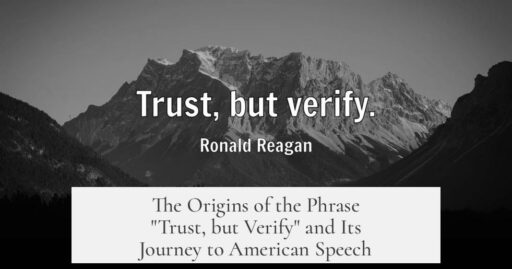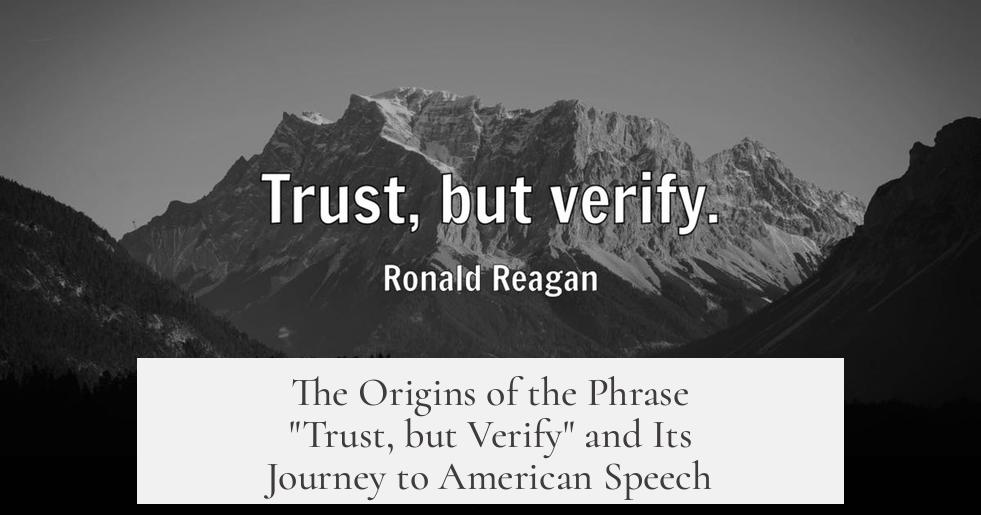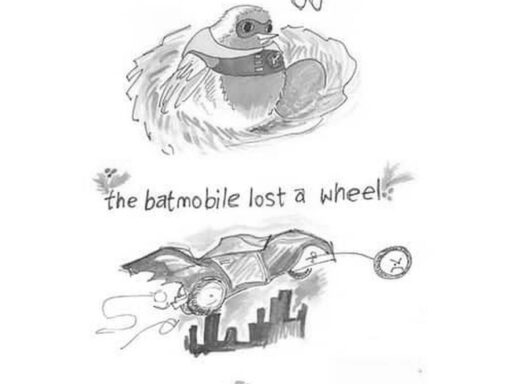The phrase “Trust, but verify” originates from a Russian proverb, доверяй, но проверяй (doveryai, no proveryai), which literally means “trust, but check.” It functions as an imperative, advising individuals to trust someone, yet always confirm the trustworthiness through verification.
This proverb has deep roots in Russian culture, where it serves as practical advice advocating caution alongside trust. The structure uses verbs in the second person singular imperative form, emphasizing direct instruction. It encourages a balance between confidence and scrutiny in interactions or agreements.
During the Cold War, Americans encountered the phrase in varying contexts. Some used it with a tone of derision aimed at Soviet officials, viewing them skeptically or dismissively. Others absorbed the saying almost incidentally, reflecting outdated Soviet-era knowledge rather than a nuanced understanding of its meaning.
The phrase gained significant prominence in contemporary English largely due to Ronald Reagan. In the 1980s, Reagan employed the proverb during negotiations on nuclear arms treaties with the Soviet Union. By citing “trust, but verify,” he succinctly captured the tension between diplomatic trust and the need for rigorous verification in arms control.
Reagan’s use made the proverb a widely recognized aphorism in American political discourse. It embodies a principle especially relevant in diplomatic or security contexts, where skepticism must accompany formal agreements to ensure compliance.
| Aspect | Details |
|---|---|
| Origin | Russian proverb: доверяй, но проверяй (trust, but verify) |
| Meaning | Advocates trust with confirmation through verification |
| Cold War Usage | Used by Americans with mixed interpretations, either derision or outdated knowledge |
| Popularization in English | Attributed to Ronald Reagan during nuclear arms treaty talks with the Soviet Union |
Key takeaways:
- “Trust, but verify” is a direct translation of a Russian proverb instructing caution.
- Its balanced approach combines trust with the necessity of checking facts.
- Americans encountered it during the Cold War with varying perceptions.
- Ronald Reagan introduced the phrase widely in English in diplomatic contexts in the 1980s.
The Origins of the Phrase: Trust, but Verify
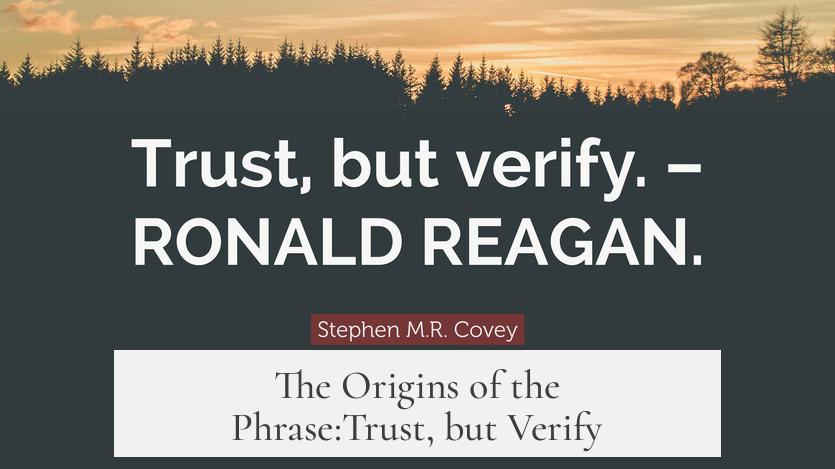
Ever wonder where the phrase “Trust, but verify” really comes from? Is it just a catchy saying politicians use to sound wise? Or does it have deeper roots? Let’s dig into the story behind this famous phrase.
First off, here’s the bottom line: “Trust, but verify” originally comes from a Russian proverb. It’s not some clever English invention or a slick Cold War tagline. This phrase has been around for a long time in Russia, and it means exactly what it says: you trust someone, but you still check their work.
The Russian Roots
The phrase in Russian is “доверяй, но проверяй” (pronounced doveriai, no proveriai). It’s a direct command: “trust, but verify.” Each verb is in the second person singular imperative form, which basically means it’s telling *you* to do exactly that. Not just a vague suggestion.
| Russian | Transliteration | English |
|---|---|---|
| доверяй, но проверяй | doveriai, no proveriai | Trust, but verify |
It’s a common proverb in Russia—used in everyday life, business, and politics. The significance? Even when you trust someone, you should keep a close eye on things. Sounds like practical advice, right?
How Did It End Up in American Speech?
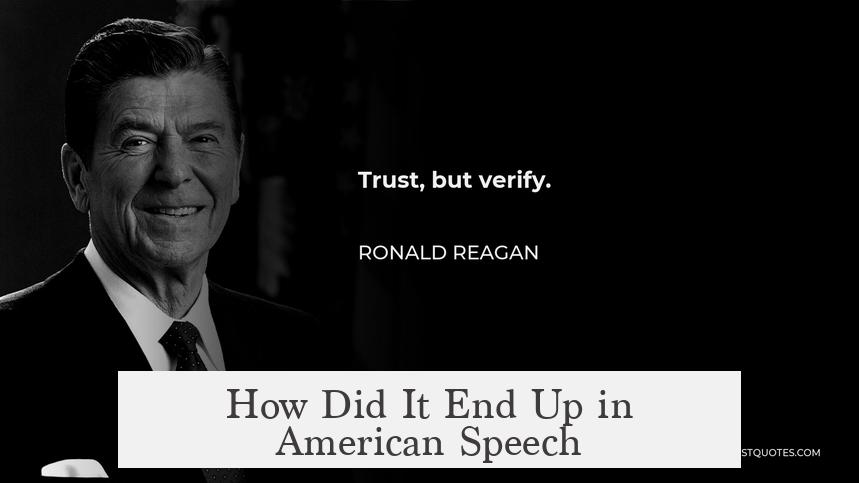
Here’s where things get interesting. During the Cold War, this phrase started popping up among Americans, but not always for the reasons you might think.
Some Americans used it to mock Soviet leaders, treating it as if it showed a kind of simple-minded thinking in Soviet bureaucracy—like they were “village morons” blindly repeating old sayings. Others just used it because their understanding of Russian culture was stuck in the 19th century. Basically, they repeated what they heard without really knowing the phrase’s origins or meanings.
So, the phrase floated around the public consciousness, sometimes with a lot of sarcasm and misunderstanding attached.
Ronald Reagan – The Man Who Made It Famous
Now, you might be thinking, “Wait, wasn’t it Ronald Reagan who came up with this phrase?” Nope. But he definitely *popularized* it in the English-speaking world. And his timing couldn’t have been better.
During the 1980s, Reagan often used “trust, but verify” when talking about nuclear arms treaties with the Soviet Union. He used it to stress that, although the U.S. wanted to trust the Soviets to follow through on arms reduction, it was still crucial to check and confirm those agreements.
“You can trust, but verify.”
– Ronald Reagan
Reagan’s use injected the phrase with new life and a very clear political meaning. It became a principle for diplomacy and negotiations, especially during tense moments between superpowers.
Why Does This Phrase Stick Around?
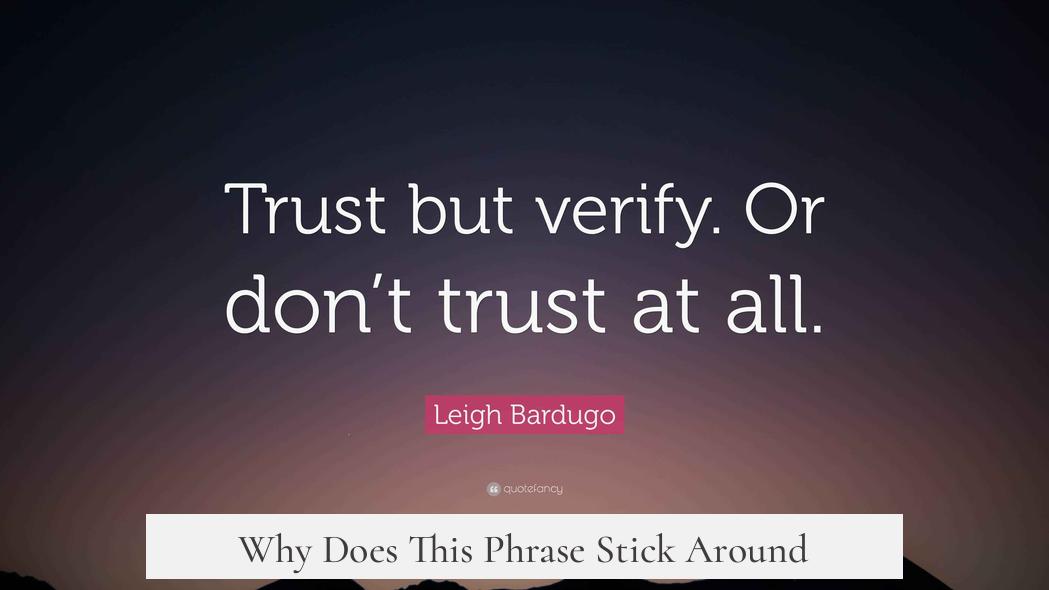
The reason “trust, but verify” is still relevant today is because it captures a universal tension. We want to believe in others, but we also want proof. It’s the balance between optimism and skepticism, faith and caution.
Think about everyday situations. You trust someone to deliver a project on time. But don’t you still double-check dates and milestones? That’s “trust, but verify” in action. It’s *practical.*
It also plays a huge role in business, security, and even personal relationships. Trust is essential, yet blind trust can lead to disaster. Verification saves from surprises.
Lessons and Tips from the Phrase
- Balance is key: Don’t become paranoid checking every little thing, but don’t ignore glaring red flags.
- Verification builds trust: When you show you verify agreements, you instill confidence and accountability.
- Use modern tools: Today, verification might mean emails, digital signatures, or audit trails – not just asking a second time.
Next time you hear or think about this phrase, ask yourself: How am I balancing trust with proof? Can I be more effective by verifying without becoming suspicious?
A Personal Story

A friend once trusted a contractor to fix their roof. They had a contract, but no follow-up. Weeks later, leaks appeared. Lesson? “Trust, but verify.” Sending photos during progress and requesting updates would’ve helped avoid costly damage.
This saying isn’t just Cold War jingo—it’s everyday wisdom disguised as a catchy proverb.
In Conclusion
The phrase “Trust, but verify” began as a Russian proverb that demands you balance faith with proof. It was adopted during the Cold War, sometimes misunderstood or mocked, but found real global fame thanks to Ronald Reagan’s savvy use during nuclear treaty talks. Today, it’s a timeless piece of advice.
In a world full of complex relationships and challenging negotiations, wouldn’t it be smart to live by this simple phrase? It’s a reminder to be wise, practical, and clear-eyed. So, the next time you face a deal or promise, ask yourself: Do I trust, but also verify?
